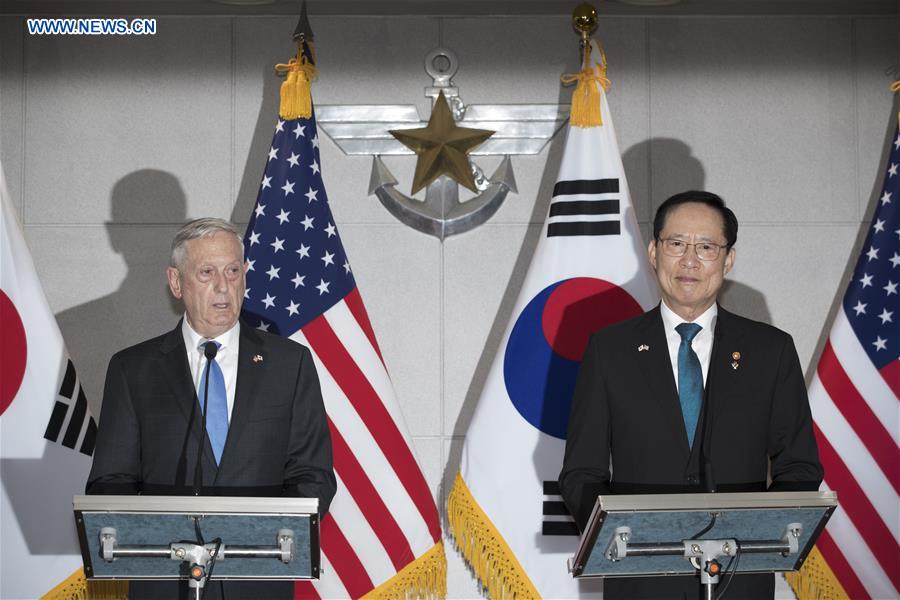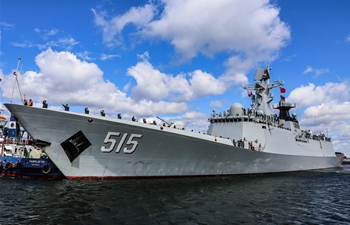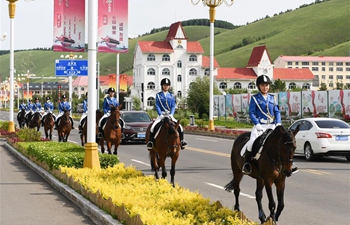
U.S. Secretary of Defense James Mattis (L) and his South Korean counterpart Song Young-moo meet the press before their talks at the Seoul defense ministry's headquarters, South Korea, June 28, 2018. Defense chiefs of South Korea and the United States agreed Thursday to continue peace measures as long as talks with the Democratic People's Republic of Korea (DPRK) last, Seoul's defense ministry said. (Xinhua/Press Corps)
SEOUL, June 28 (Xinhua) -- Defense chiefs of South Korea and the United States agreed Thursday to continue peace measures as long as talks with the Democratic People's Republic of Korea (DPRK) last, Seoul's defense ministry said.
U.S. Secretary of Defense James Mattis visited South Korea to hold talks with his South Korean counterpart Song Young-moo at the Seoul defense ministry's headquarters.
Under the joint statement released after the talks, the two sides agreed to keep considering measures to build mutual trust and peace on the Korean Peninsula as long as a goodwill dialogue with the DPRK lasts.
They discussed the recent measures taken to ease military tensions and build trust, including the suspension of the Ulchi Freedom Guardian (UFG) joint annual military exercises between Seoul and Washington originally scheduled for August.
South Korea and the United States halted the summertime war games after top DPRK leader Kim Jong Un and U.S. President Donald Trump held the first-ever DPRK-U.S. summit in Singapore on June 12.
The UFG is a computer-simulated command post exercise, which the DPRK had denounced as a dress rehearsal for northward invasion.
Mattis and Song agreed to announce the scale, schedule and contents of future South Korea-U.S. joint military drills through consultations between the two sides.
They confirmed that UN Security Council sanctions on Pyongyang over its nuclear and missile programs should be implemented until the DPRK takes concrete and irreversible measures for denuclearization.
After the Singapore summit, Kim and Trump agreed to complete denuclearization of the peninsula in exchange for security guarantees for the DPRK.
Amid rising detente on the peninsula, Song and Mattis agreed to strengthen cooperation to meet conditions for the United States to return back its wartime operational control of South Korean troops early while considering the security situations change on the peninsula sufficiently.
South Korea's wartime command was handed over to the U.S. forces after the 1950-53 Korean War broke out. The country won back its peacetime operational control in 1994.
Seoul and Washington had agreed to the conditions-based transfer of wartime operational control of South Korean troops from Washington to Seoul when South Korea's military is capable of leading the combined defense on the peninsula.
The two defense chiefs paid attention to a significant advance in preparing for the transfer of wartime operational control, according to the joint statement.
They assessed that the South Korea-U.S. alliance is more ironclad than ever, agreeing to closely cooperate to develop the alliance into a future-oriented, mutually-complementary one.
Before the talks with Song, Mattis said in his introductory remarks that the United States would maintain its troops on the peninsula as part of efforts to help defense South Korea.
About 28,500 U.S. troops have been stationed here in South Korea, a legacy from the Korean War that ended with armistice, not peace treaty.















